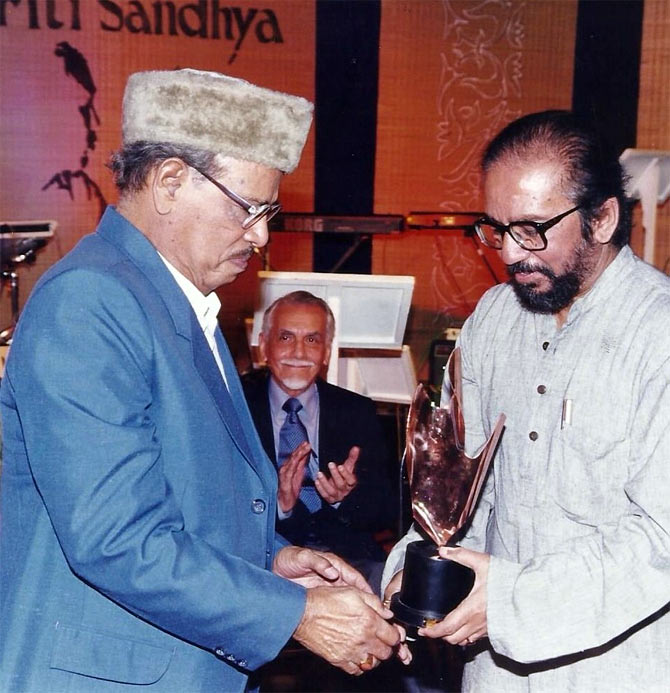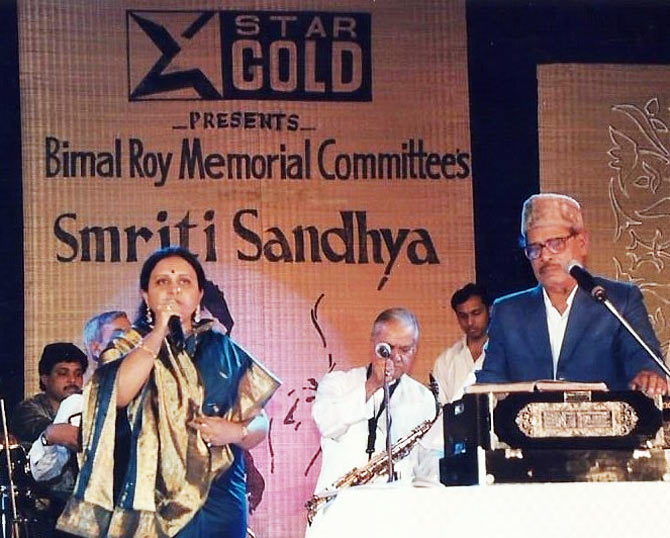 | « Back to article | Print this article |
'Manna Dey was too humble for the glamorous Bollywood'
Rinki Roy Bhattacharya, daughter of acclaimed filmmaker Bimal Roy, feels that Manna Dey never received the popularity Kishore Kumar or Mohammad Rafi had, as he was too humble for the glamorous world of Bollywood. She pays tribute to the late singing legend, who passed away on October 24.
Manna Kaka -- Manna Dey to the world -- bore no Bollywood stamp.
Looking at him, no one would recognise the man as the golden voiced playback artist, the singer whose repertoire embraced every singing style, who belonged to gharanas that are dramatically distinct, from classical to folk, from kirtan to jazz.
I started the Bimal Roy Memorial in 1997 to document the musical journey of my famous father, Bimal Roy. By the 1990s, there were few individuals from my father’s generation still around.
Manna Kaka was one of them, besides Sunil Dutt. Of course the Mangeshkars were and are still there but they are inaccessible to lesser mortals like us and I did not want to be put through an identity parade.
So I called up Manna Kaka to perform for the inaugural concert on February 6, 1997.
“Of course I will,” he assured me in his rich baritone voice.
His next question stumped me. “Rinki, how many songs can I sing?”
Thrilled, I replied cheekily, “As many as you want!”
Pleased, he retorted, “Good.”
At the concert, his first rendition was the celebrated Do Bigha… number, Bhai Re, Dharti Kahe Pukaar Ke.
As his voice scaled the giddy peak, it was as if an electric current had pierced the audience. They clapped until their palms ached. I had goose bumps... Such incredible power at the age of 80?
Everyone present was filled with nostalgia.
Then he sang many request numbers without a fuss. At the end of the show, when I presented him an envelope, he glared at me.
“What’s in there?”
“Your cheque,” I mumbled apologetically, fearful if I had done justice to a living legend.
“Pagol na matha kharap?” (Are you mad or something?) he scolded me. The envelope remained with me.
'Manna Kaka was content with what he had achieved'
Every time he came to perform, fees were waived as a loyal gesture to my father, to that generation he belonged to and no doubt, missed.
Amongst my personal Manna Dey favourites are Yeh Raat Bheegi Bheegi (from Chori Chori), that romantic melodious number, and the poignant Ae Mere Pyare Watan (Kabuliwala).
His qawwali number from Waqt -- Aye Mere Zohra Jabeen -- is rich in understated eroticism. Achieving that in three minutes flat is a feat few can dare.
Whether it is the lilting romantic melodies, some tinged with eroticism, or pure classical bandishes and bhajans or the yearning for motherland in a voice throbbing with poignant pain -- this gifted singer commanded a rare combination of virtuosity, talent and discipline.
If some composers typecast him as merely a classical singer, it was their creative loss.
Lamentably, he never received the popularity Kishore Kumar or Rafi saab had. Nor did he aspire to.
Manna Kaka was content with what he had achieved in the long life granted to him and continued to sing for newcomers and the public without a fuss or murmur.
Witty, warm, generous and full of humility, Manna Kaka was a caring husband and father.
To my mind, Manna Dey, the individual, was too humble, in fact, too human for the glamorous Bollywood.
Memories of him as a warm and caring performer continue to sparkle in my memory.

